Graham Downs's Blog, page 23
December 13, 2016
My Favourite Books of 2016

According to Goodreads, I read thirty-five books this year - and I may squeeze another one or two in before the end of December.
I review every single book I read, but one thing you'll realise about me is that I am very ruthless when it comes to my reviews. Because of this, of all the books I've read this year, only five managed to earn a coveted five stars from me.
I started the Song of Ice and Fire series by George R.R. Martin (on which the HBO series Game of Thrones is based), and was quite shocked to find that, looking back, three of those five were from that series!
My five favourite books of 2016 are therefore:
Write Your Way Out Of Depression: Practical Self-Therapy For Creative Writers by Rayne HallA Storm of Swords (A Song of Ice and Fire, #3) by George R.R. MartinMold by Lindsey GoddardA Clash of Kings (A Song of Ice and Fire, #2) by George R.R. MartinA Game of Thrones (A Song of Ice and Fire, #1) by George R.R. Martin
I hope you enjoy my reviews, and that this list will introduce you to some new books and authors you've maybe never heard of before.
For each book, click on the title to see a list of all stores where you can buy it online.
Write Your Way Out Of Depression: Practical Self-Therapy For Creative Writers by Rayne Hall
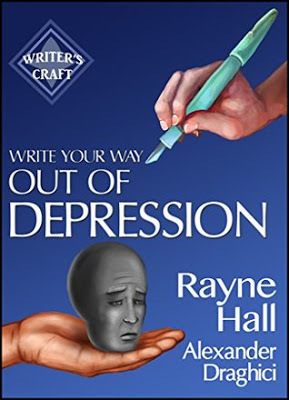
About the BookUse your writing talent and your skill with words heal yourself. Author Rayne Hall and psychologist Alexander Draghici show fourteen practical strategies for self-therapy.
Do you feel like you’re trapped in a dark hole of morass, sinking deeper and deeper, the mud rising to your hips, your chest, your throat? Is despair smothering you like a heavy blanket? Is your own life moving past you like a train, and you are forced to watch and cannot board? Has crippling lethargy wrapped its tentacles around you so tightly that you cannot move, sucking from you all energy and the will to live?
If you want to get better, to feel alive again, if you want to step out of this darkness and take control of your recovery, this book can help.
My ReviewThis was a difficult book to read, and is proving to be a difficult book to review as well. Mostly, because it's so intense, and sometimes reading it can be depressing in itself.
Let me explain: I do believe most artists suffer from some or other form of depression or anxiety, and writers are no different. I definitely think I do, although I've never been officially diagnosed. I can identify with many of the issues described in this book - which is good, because it assures me that I'm not alone. On the other hand, I obviously don't have depression nearly as bad as some of my writer colleagues from around the world, because many of the issues described in this book were so over-the-top that I had trouble believing some people have it as bad.
I do believe it, though, and that's where the depression came in.
In Write Your Way Out of Depression, Rayne Hall confesses her own struggle with the disorder, and how she found healing by writing. And that's what this book is actually about. It's full of practical, no-nonsense advice, and tricks that you can try at home to help ease your pain... and become a better writer in the process.
The writing advice in this book is presented in a way typical of the rest of the Writer's Craft series, which I'm no stranger to, and I've always found extremely helpful. For this particular instalment, Ms Hall decided to recruit clinical psychologist Alexander Draghici. He gives credence to her words, but also, after each tip, he gives a bit of an explanation about what aspect of the disorder the advice is actually trying to address, and how and why it works. I thought that was a nice touch!
I'd recommend this book to any creative types (not just writers) who suffer, or think they might suffer from depression. You can pick and choose which advice you want to follow, based on what you have the energy for on any given day, and what you think might help for you. If you've tried everything else, try this - it might help!
Mold by Lindsey Goddard
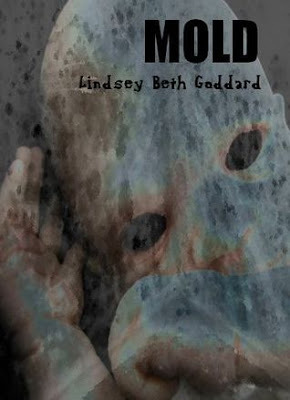
About the BookWhen a new mother is forced to move into an old boarding home, she discovers the dark secret behind the phantom mold that keeps appearing on her walls.
My ReviewI really enjoyed this little story. Not so much scary as creepy, it's very psychological.
The writing is brilliant, and the pacing is just right. It definitely made me think... and I liked the open ending, too!
A Game of Thrones (A Song of Ice and Fire, #1) by George R.R. Martin
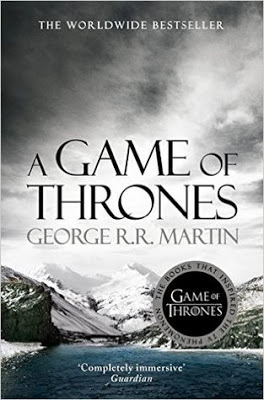
About the BookSummers span decades. Winter can last a lifetime. And the struggle for the Iron Throne has begun.
As Warden of the north, Lord Eddard Stark counts it a curse when King Robert bestows on him the office of the Hand. His honour weighs him down at court where a true man does what he will, not what he must ...and a dead enemy is a thing of beauty.
The old gods have no power in the south, Stark's family is split and there is treachery at court. Worse, the vengeance-mad heir of the deposed Dragon King has grown to maturity in exile in the Free Cities. He claims the Iron Throne.
My ReviewThat was epic.
I first heard about Game of Thrones from the TV series. I watched Season One, and a little bit of Season Two. To be honest, I really really wanted to like it. But hard as I tried, I couldn't get into it; everything was just so confusing, and there were way too many characters and plot lines to follow. I gave up after the third or fourth episode of Season Two.
Then, people started talking about how much better the book is. I still really really wanted to like it, so I decided to give it a read.
Those people were right. As is typically the case, the book is about a thousand times better than the TV series. There are still lots of characters, and many different plot lines. In fact, there are more sub-plots than there are on TV, but the book goes into so much more detail, that everything just started falling into place. That, and the fact that I'm reading the book at my own pace, and can always page back if I forget who a certain character is, or where he fits into the story.
The characters are all instantly memorable, but fair warning: what you've heard about Mr Martin's propensity to kill your favourites off without warning is absolutely true. It makes the world feel more real, though, and it's very period-appropriate. One moment you believe that a character's going to be the saviour of the world, and live on throughout the series, and the next there's a jousting accident and he's dead. Gone. Never to be mentioned again.
My favourite character, like I think most people's favourite is (whether you're reading the book or watching it on TV), is Tyrion Lannister, the Imp. He was cast perfectly in the TV show, but he's portrayed in even more detail in the book. If you'll indulge me, I'll share a quick quote:
"How would you like to die, Tyrion Lannister?"
"Peacefully in bed, with a young whore's mouth around my cock, at the age of eighty."
Something like that. I may have paraphrased.
Other things I noticed, that made the world seem more real, and more appropriate to the period, were the ages of the characters. I think they're mentioned on TV, but it's little more than a gloss-over, if I remember correctly. Jon Snow, for example, is fourteen years old when he goes to spend the rest of his life on The Wall. Dany is thirteen on her wedding night, and her husband is something like twenty-five. I understand that stuff like that would be difficult to portray on screen, because of modern sensitivities to things like the age of consent and statutory rape.
If you've watched Season One of the TV series, you're sure to enjoy the book, because it contains things that I don't remember seeing on TV. If you haven't, you're even surer to enjoy the book.
Oh, one more thing: the book actually ends a little way (probably the third or fourth episode) into Season Two of the TV series. Which happens to be about when I gave up watching, so from here on in, everything's going to be new for me!
A Clash of Kings (A Song of Ice and Fire, #2) by George R.R. Martin
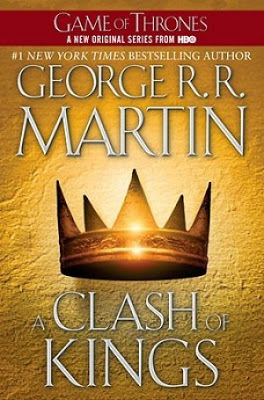
About the BookTime is out of joint. The summer of peace and plenty, ten years long, is drawing to a close, and the harsh, chill winter approaches like an angry beast. Two great leaders—Lord Eddard Stark and Robert Baratheon—who held sway over an age of enforced peace are dead...victims of royal treachery. Now, from the ancient citadel of Dragonstone to the forbidding shores of Winterfell, chaos reigns, as pretenders to the Iron Throne of the Seven Kingdoms prepare to stake their claims through tempest, turmoil, and war.
As a prophecy of doom cuts across the sky—a comet the color of blood and flame—six factions struggle for control of a divided land. Eddard's son Robb has declared himself King in the North. In the south, Joffrey, the heir apparent, rules in name only, victim of the scheming courtiers who teem over King's Landing. Robert's two brothers each seek their own dominion, while a disfavored house turns once more to conquest. And a continent away, an exiled queen, the Mother of Dragons, risks everything to lead her precious brood across a hard hot desert to win back the crown that is rightfully hers.
A Clash of Kings transports us into a magnificent, forgotten land of revelry and revenge, wizardry and wartime. It is a tale in which maidens cavort with madmen, brother plots against brother, and the dead rise to walk in the night. Here a princess masquerades as an orphan boy; a knight of the mind prepares a poison for a treacherous sorceress; and wild men descend from the Mountains of the Moon to ravage the countryside.
Against a backdrop of incest and fratricide, alchemy and murder, the price of glory may be measured in blood. And the spoils of victory may just go to the men and women possessed of the coldest steel...and the coldest hearts. For when rulers clash, all of the land feels the tremors.
Audacious, inventive, brilliantly imagined, A Clash of Kings is a novel of dazzling beauty and boundless enchantment;a tale of pure excitement you will never forget.
My ReviewI think that one of the things that makes this serious utterly engrossing, is the attention to detail.
The universe is so well fleshed out, and the characters who live in it do so in a completely believable way. For example, with the notable exception of Joffrey, I don't think there are any "bad" guys in this story. There aren't any "good" guys, either. There are just people, with deep and complex motivations and goals, and everything they do or say fits in with those motivations, and their circumstances in the world. If I put myself into any one of their shoes, I cannot say that I'd do anything different.
This book is actually better than A Game of Thrones, in my opinion. There's a lot more action... and a lot of stuff happens. Unfortunately, I can't tell you very much of it for fear of spoilers, but I will say that many of our favourite characters return, and quite a few very important characters die. Oh, and there be dragons.
Something else that I thought was pretty cool: I read A Game of Thrones three months ago, and there were a few minor details I'd forgotten. George R.R. Martin does such a wonderful job of explaining each character's place in the world as we first meet them, that it was a pleasurable experience when the memories of each came flooding back. I'd almost (almost) say that it's not necessary to have read the first book in the series to enjoy the second. But I think you'd miss quite a bit.
A Storm of Swords (A Song of Ice and Fire, #3) by George R.R. Martin
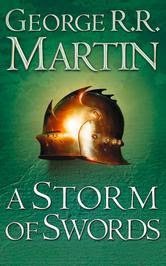
About the BookHere is the third volume in George R.R. Martin's magnificent cycle of novels that includes A Game of Thrones and A Clash of Kings. Together, this series comprises a genuine masterpiece of modern fantasy, destined to stand as one of the great achievements of imaginative fiction.
Of the five contenders for power, one is dead, another in disfavor, and still the wars rage as alliances are made and broken. Joffrey sits on the Iron Throne, the uneasy ruler of the Seven Kingdoms. His most bitter rival, Lord Stannis, stands defeated and disgraced, victim of the sorceress who holds him in her thrall. Young Robb still rules the North from the fortress of Riverrun. Meanwhile, making her way across a blood-drenched continent is the exiled queen, Daenerys, mistress of the only three dragons still left in the world. And as opposing forces manoeuver for the final showdown, an army of barbaric wildlings arrives from the outermost limits of civilization, accompanied by a horde of mythical Others—a supernatural army of the living dead whose animated corpses are unstoppable. As the future of the land hangs in the balance, no one will rest until the Seven Kingdoms have exploded in a veritable storm of swords...
My ReviewI'm thoroughly enjoying this series, but I can't think of anything else to say about it at this point without spoiling anything.
The depth of characters, the complicated and well thought out plots and motivations, the rich detail of the setting... what's not to like?
I will say that a lot happens in this instalment; more than in either volume before it. And the trend looks set to continue, because according to Wikipedia, each book is longer than the last. I hope this isn't too big of a spoiler, but lots of people die in this one. It's almost as though the author is clearing away some older characters to make way for new ones.
As I intimated earlier, this book IS long, and I'm not the kind of person who can read a whole book series back-to-back. That's particularly true for this one because it's also very intense. I'll be taking a bit of a break before diving into the next book.
Published on December 13, 2016 06:31
December 6, 2016
Authors' Newsletters: What Makes You Sign Up?
 I'm not sure how it is in other industries, but nowadays, most authors - especially independent authors - will tell you that their biggest asset is their e-mail list.
I'm not sure how it is in other industries, but nowadays, most authors - especially independent authors - will tell you that their biggest asset is their e-mail list.We cannot rely on Amazon (or Google Play, or Smashwords) to e-mail our readers when we have new books out. Rather, when a reader's finished reading one of our books, we need to grab their e-mail address as soon as possible, so we can send them e-mails about our new books, and make sure that they know about our promotions. Not only that, but readers tend to love reading about an author's life, so sending them regular newsletters can only be a good idea.
There's another problem - we're all so inundated with information these days that we tend to forget. So a reader who's never heard of me before sees a Tweet or something from me, clicks through to my website, and thinks Oh, this is interesting. I'll check him out later.
The problem is, that reader gets busy with other things going on in their life and forgets all about me. Then they see a Tweet from a different author, and the cycle repeats.
The solution, of course, is to get an e-mail address out of them the very first time they visit my website. But that's easier said than done. Again, because we're so inundated with messages nowadays, that reader may already be on more than a few mailing lists. And e-mail overload is real, which makes an e-mail address a very valuable (and closely guarded) thing.
Why should the reader give me theirs?
It's a big dilemma for authors like me, trying to get noticed. You may be interested in me, but if I don't do something to keep myself on the top of your mind, I'm going to lose your interest very quickly. How do I convince you to give me your e-mail address?
Most independent authors opt to give away something for free - "If you sign up to my e-mail list, I'll give you...." That seems to be the most effective way at the moment.
Some of those authors even give away whole books for free. That's the strategy I've adopted myself, but since I'm a multi-genre author, I have four different books to chose from: if you sign up to my e-mail newsletter, you can pick one of those four books to get as a free download.
It's still difficult, though. Even at the prospect of a free read, so many people are still reluctant to give up that precious e-mail address. Perhaps they don't trust us enough not to abuse it, or maybe for some people, nothing can ever be enough for them to tolerate yet another intrusion into their already overflowing Inboxes.
So what about you? Do you, as a reader, subscribe to the e-mail lists of any authors? If so, what was it that made you sign up? Did you give them your e-mail address freely, or did they have to woo you with something?
Published on December 06, 2016 06:37
November 29, 2016
Transport: Premium Children's Colouring Books

With all the hype about Adult Colouring Books these days, do you sometimes feel that the children are being left out?So did my wife and I. A few months ago, we embarked on a project to produce a really professional, premium line of colouring books for children.
The first instalment of that series was Animals: Premium Children's Colouring Books:


That one sold so well in its first few weeks, that we very quickly decided to do another one. This one's called Transport, and as the name implies, the pictures are all about people involved in various forms of transportation - fictional and otherwise.
We put it together in the beginning of October, threw it up on Lulu, and ordered some proofs. The proofs finally arrived this past weekend (from Europe to South Africa, via regular post).
I hope you'll agree that it was worth the wait. Aren't they beautiful?
Published on November 29, 2016 06:28
November 22, 2016
Book Review: Write Your Way Out of Depression, by Rayne Hall
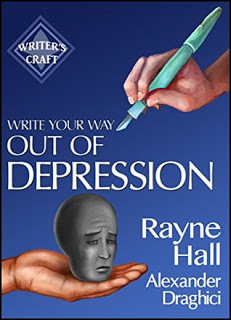
Last week, I posted about receiving an advance review copy of Rayne Hall's Write Your Way Out of Depression, and I shared some of my own thoughts for why many artists suffer from some sort of depression or anxiety.
Well, I'm pleased to announce that my review is now done, and I thought I'd share it with you:
About the Book
Use your writing talent and your skill with words heal yourself. Author Rayne Hall and psychologist Alexander Draghici show fourteen practical strategies for self-therapy.
Do you feel like you’re trapped in a dark hole of morass, sinking deeper and deeper, the mud rising to your hips, your chest, your throat? Is despair smothering you like a heavy blanket? Is your own life moving past you like a train, and you are forced to watch and cannot board? Has crippling lethargy wrapped its tentacles around you so tightly that you cannot move, sucking from you all energy and the will to live?
If you want to get better, to feel alive again, if you want to step out of this darkness and take control of your recovery, this book can help.
My Review (5 / 5 stars)
This was a difficult book to read, and is proving to be a difficult book to review as well. Mostly, because it's so intense, and sometimes reading it can be depressing in itself.
Let me explain: I do believe most artists suffer from some or other form of depression or anxiety, and writers are no different. I definitely think I do, although I've never been officially diagnosed. I can identify with many of the issues described in this book - which is good, because it assures me that I'm not alone. On the other hand, I obviously don't have depression nearly as bad as some of my writer colleagues from around the world, because many of the issues described in this book were so over-the-top that I had trouble believing some people have it as bad.
I do believe it, though, and that's where the depression came in.
In Write Your Way Out of Depression, Rayne Hall confesses her own struggle with the disorder, and how she found healing by writing. And that's what this book is actually about. It's full of practical, no-nonsense advice, and tricks that you can try at home to help ease your pain... and become a better writer in the process.
The writing advice in this book is presented in a way typical of the rest of the Writer's Craft series, which I'm no stranger to, and I've always found extremely helpful. For this particular instalment, Ms Hall decided to recruit clinical psychologist Alexander Draghici. He gives credence to her words, but also, after each tip, he gives a bit of an explanation about what aspect of the disorder the advice is actually trying to address, and how and why it works. I thought that was a nice touch!
I'd recommend this book to any creative types (not just writers) who suffer, or think they might suffer from depression. You can pick and choose which advice you want to follow, based on what you have the energy for on any given day, and what you think might help for you. If you've tried everything else, try this - it might help!
Buy the Book
Click here to see where you can buy the book.
Published on November 22, 2016 06:25
November 15, 2016
On Artists and Depression
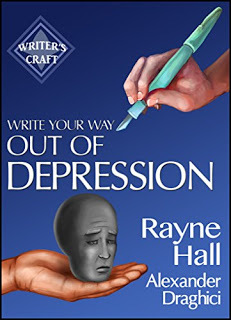
Last week, prominent author coach Rayne Hall sent me an advance review copy of her new book, Write Your Way Out Of Depression. This after we had a conversation on Twitter about a month ago, about famous writers from history who suffered from depression.
Then, on the same day as receiving the ARC, local radio presenter Roxy Blows was talking to a musician on her Mix 93.8 FM Radio show here in Johannesburg. I can't remember what the artist's name was, but one of the things he mentioned was that most musicians suffer from depression.
I've often suspected that creative people of all sorts tend to have some form of depression or anxiety disorder - whether diagnosed or not. What's more, one of my Facebook friends is a painter, and she often posts about her depression.
The thing is, I don't know whether being an artist makes one depressed, or if it's just that depressed people tend to be more disposed to the creative pursuits.
I have heard before that emotional trauma can lead to depression, if your resilience isn't strong enough. Even if you are resilient enough to get through a particular trauma, multiple traumas in a short space of time can really wear you down. An example was losing your beloved pet. Okay, it's sad, but you can deal with that. A week later, one of your parents passes away, and a month after that, you have a big fight with your long-term girlfriend and end up breaking up with her.
All these things have a cumulative effect on your psyche, and eventually, you crack.
Although it feels silly to put what I'm about to say in the same league as the above, there are many different types of trauma. I think that rejection is a valid form, and as artists of all types, we're used to suffering rejection after rejection as we try to get our work noticed by the world.
Do you think that could be a cause? Or is it something else?
What came first - the depression or the artist?
Published on November 15, 2016 06:37
November 8, 2016
Physical Description for Characters

When you're reading a book, how do you feel about physical descriptions of characters?
Do you like to know exactly what a character looks like, from skin tone, to hair and eye colour, to height and weight? Or do you prefer to use your imagination?
For myself, I tend to be very light on my character descriptions. Unless it's plot-relevant, you probably won't know what colour my character's hair or eyes are, or his skin tone, or how big his biceps are (I know romance readers need all those details, but suck it up).
And there's a conscious reason for that: I feel that every reader's going to imagine a character based on his or her own cultural experience.
For example, in Stingers, my protagonist is a skinny thirteen-year-old boy. That's about all you get - although I might mention at some point (I can't remember) the fact that he wears a school uniform - which is relevant, because in South Africa, public school kids wear uniforms.
Who's to say that that character isn't black, or asian? In my mind he's a middle-class white kid from a middle class family, but I mean no disrespect or prejudice by that. If you want to make him a poor black kid from the township, I'm not going to tell you you're wrong, because it's simply not relevant to the plot - like Hermoine from Harry Potter: J.K. Rowling never said she was white. When they made the movies, they cast a white actress, but there have been stage performances in the US where she's been black.
Does it make a difference?
Worse, it could hamper certain readers' enjoyment of the story, I think, if I insisted that a character looked a certain way - unless I was specifically writing a book about hatred towards blond(e)s, for example. Then I might insist that a character had blond hair - then it would be relevant.
Published on November 08, 2016 06:35
November 1, 2016
Readers, how do you find books?

I've been thinking a lot lately about how readers discover books.
To give you some background, for readers who may not know, all e-book retailers are basically search engines. The idea is when a reader is looking for a new book to read, she'll head over to her favourite e-book retailer (Amazon or Google Play Books or Kobo, or whatever) and punch something into the search box there. She will then browse through the results that the retailer returns, and select her next read.
Besides the title and product description, there are two things that cause a book to show up in these results. The first is the book's category, and the second is a list of keywords that the author or publisher enters to describe the book.
Amazon and Smashwords are both rather restrictive, and allow self-published authors to choose up to two categories for our books. Kobo allows up to three, and Google Play allows as many as you want. Which is great, because more often than not, a given book falls into more than two or three categories.
I've been struggling to come up with which categories are the best fit for my books. I think that stems from the fact that as authors, the way we search for books is drastically different from the way readers do.
I Need Your Help
Readers, I need your help! If you were searching for a book to read, what would you put into Amazon's (or Kobo's, or Google Play's) search box?
Let's Play a Game
In fact, let's play a game: Imagine you're on the lookout for a book to read. Take the keywords you would enter into your favourite retailer's search engine, and instead, enter them into the comments below.
You don't have to explain anything - just enter your search string into the comments.
It may sound rather silly, but it will help give me and other authors valuable insights into what readers are looking for - for example, does anybody ever actually type "Juvenile Fiction" into a search box?
I really appreciate your time. Don't forget, you can get a free e-book in exchange for signing up to my e-mail newsletter. Click here for more info.
Published on November 01, 2016 07:19
October 25, 2016
Book Review: The Stand by Stephen King
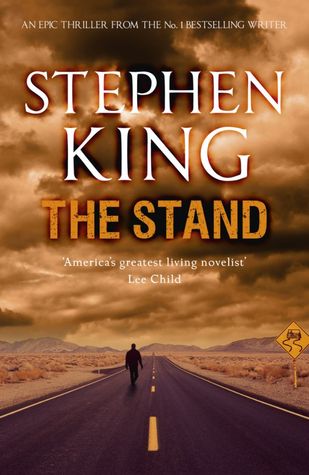
About the Book
First came the days of the plague…
After the days of the plague came the dreams.
Dark dreams that warned of the coming of the dark man. The apostate of death, his worn-down boot heels tramping the night roads. The warlord of the charnel house and Prince of Evil.
His time is at hand. His empire grows in the west and the Apocalypse looms…
My Review (3 / 5 Stars)
This is probably the lowest rating I've ever given a Stephen King book. And I was really torn between three and four stars.
Allow me to explain:
First of all, I really enjoyed the story. It's incredibly well plotted and detailed, and the characters are all very fleshed out. The writing, in general, is exquisitely good, as it typical of "Uncle Stevie".
The thing is, this book is LONG. I bought it on Kindle, and I inadvertently bought the "unabridged version", which is supposed to contain over 400 extra pages, that weren't included in the original because of financial concerns at the publisher. Since I'd never read the story before, and knew next to nothing about it, I wasn't to know.
Having now read it over the course of just under a month and a half, I can say with confidence that it could've done without those extra 400 pages. And I could tell pretty easy which pages weren't in the original because they're mostly the ones that need some editing care. It's plain as day, actually, that certain scenes, certain chapters, in some cases whole characters, were simply "bolted on".
People tell me that The Stand is the scariest book they've ever written. Well, fear is very subjective, because I hardly found it scary at all. It was a bit creepy at times (most notably the ouija board scene), but nothing I would call "scary". It IS a very religious story, and maybe the reason why I wasn't particularly scared is because of my religious background, and the fact that I was able to separate the things that I KNOW could happen (and do happen) in real life, from the things that couldn't.
I will say that my first encounter with Randall Flagg was a good one. He may just be the best villain ever conceived. Which book featuring him should I read next?
Buy Now
E-BookPaperback (South Africa)
Published on October 25, 2016 07:29
October 18, 2016
The Morality of Self-Driving Cars
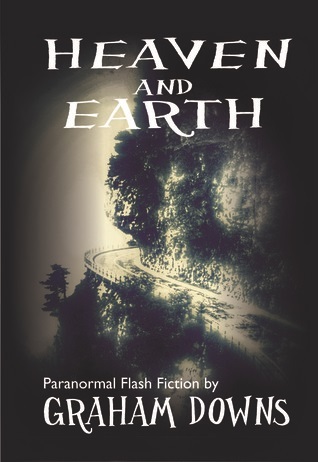 About two years ago, I wrote a flash fiction story called "An Automatic Decision", which you can find in the flash fiction collection, Heaven and Earth: Paranormal Flash Fiction.
About two years ago, I wrote a flash fiction story called "An Automatic Decision", which you can find in the flash fiction collection, Heaven and Earth: Paranormal Flash Fiction.In it, I speculated what might happen if a self-driving car had to make a decision between saving the life of its driver, and saving the life on an innocent bystander.
When I wrote it, I had no idea how prophetic that would turn out to be. I read an article yesterday on Co,Exist, entitled Self-Driving Mercedes Will Be Programmed To Sacrifice Pedestrians To Save The Driver. Here's a quote from that article:
One of the biggest debates about driverless cars concerns the moral choices made when programming a car's algorithms. Say the car is spinning out of control, and on course to hit a crowd queuing at a bus stop. It can correct its course, but in doing so, it'll kill a cyclist for sure. What does it do? Mercedes's answer to this take on the classic Trolley Problem is to hit whichever one is least likely to hurt the people inside its cars. If that means taking out a crowd of kids waiting for the bus, then so be it.
Scary, isn't it?
I don't know about you, but if you ask me, that's definitely a decision that should be left up to the driver!
Maybe the driver should be able to set some parameters beforehand, to tell the car what should happen in that situation.
Of course, it would be ideal if the car could do what it did in An Automatic Decision, which would be to stop time. But that's not going to happen, now is it?
What do you think? Should a self-driving car be allowed to make a call between saving a single human life, and potentially dozens?
Published on October 18, 2016 07:27
October 11, 2016
Any Other Indie Authors on Google Play?
 Let's face it, Android is the most popular smartphone operating system in the world today.
Let's face it, Android is the most popular smartphone operating system in the world today.And Android comes bundled with, among other Google Play apps, Google Play Books.
Yet, you don't hear of very many independent authors' books being available there... at least, I haven't.
Well, I am very happy to announce that, from this week, mine will be!
You won't find all my books immediately. I'm adding them in drips and drabs. But if you have an Android smartphone or tablet, please check back often; within the next week or so, you'll be able to get every one of my books on Google Play.
Click here to visit my author page at Google Play Books.
As a reader, have you ever purchased books from Google Play? If so, what do you think of the service? Is it convenient? What's their e-reader like?
(Note: I am in no way affiliated with Google Play. My books just happen to be available on the platform.)
Published on October 11, 2016 07:47



